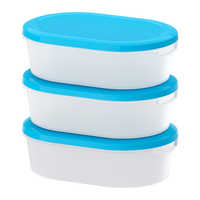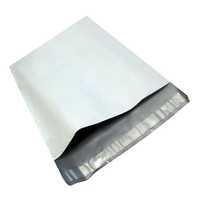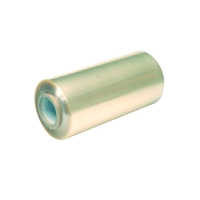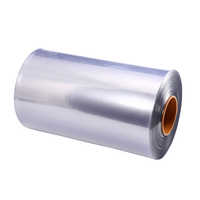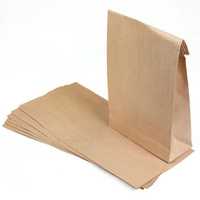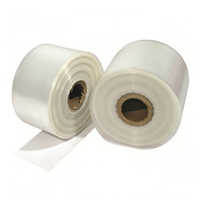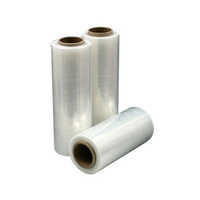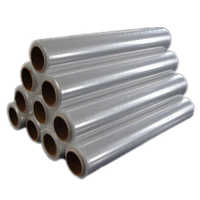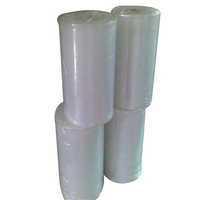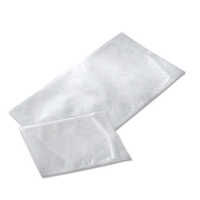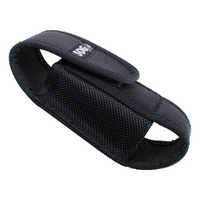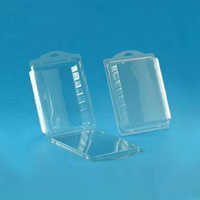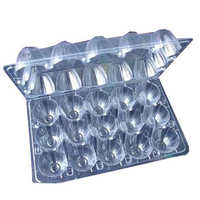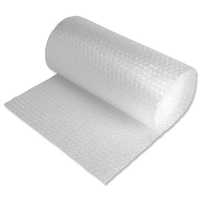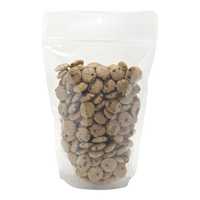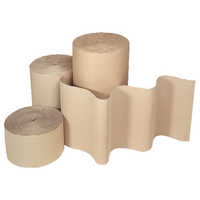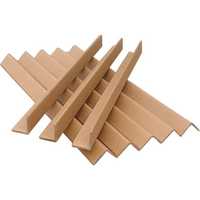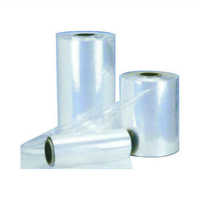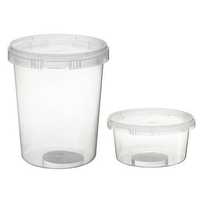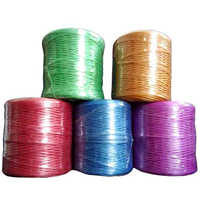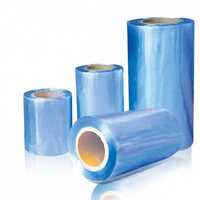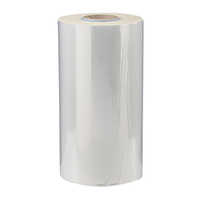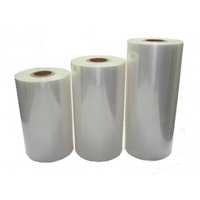Plastic Packaging Materials
(7475 products)
Related Categories
Adhesive Tapes
Aerosols
Agricultural Films
Aluminium & Foils
BOPP Films
Biodegradable Products
Bottle Caps & Plastic Lids
Bottles
Cork & Cork Products
Corrugated Boxes
Craft Paper
Disposable Products
Drums & Barrels
Foam,Rexine & PU Products
Food Packaging Materials
Holograms & Holographic Films
Household Paper
Industrial & Speciality Paper
Industrial Tape
Labels, Stickers & Tags
Lamination Material
Metal Containers & Cans
Napkins
Nets
Non Woven Bags
PP & HDPE Sacks
Packaging & Printing Projects
Packaging Bags
Packaging Boxes
Packaging Clips
Packaging Films
Packaging Foil
Packaging Papers
Packaging Product Stocks
Packaging Products Agents
Packaging Tubes
Packing & Sealing Tapes
Pallets & Crates
Paper & Paper Made Products
Paper Bags
Paper Cone
Paper Cups, Plates & Food Trays
Paper Rolls
Photographic Paper
Plastic Bags
Plastic Boxes
Plastic Containers
Plastic Packaging Materials
Polyester Film
Printing & Writing Paper
Protective Packaging Materials
Sanitary Paper
Straps
Thermal Paper
Thermocol
Tin Containers
Warning Tapes
Woven Bags
Top Plastic Packaging MaterialsCategories
Explore More Categories
Indian Inquiries Only
Air Bubble Transparent Roll
Price: 750 INR (Approx.)/Roll
MOQ - 10 Roll/Rolls
12 Years
Business Type: Manufacturer | Supplier
KP INDUSTRIES
Indian Inquiries Only
Multicolour Laminated Printed Pouches
MOQ - 50 Piece/Pieces
15 Years
Business Type: Manufacturer | Supplier
AASHIRWAD POLY PRINT
Glass Syringes For Pharmaceuticals Medicine Packaging
Price: 4000 INR (Approx.)/Piece
MOQ - 1 Piece/Pieces
4 Years
Business Type: Manufacturer | Supplier
LABH PROJECTS PVT. LTD.
Verified Exporter
( Accepts only Foreign Inquiry)
Printed Plastic Rolls Application: For Promotion Use
Price: 150 INR (Approx.)/Kilograms
MOQ - 50 Kilograms/Kilograms
Product Type - Plastic Rolls
Material - Polyester -BOPP
Thickness - 50-60 Microns. Millimeter (mm)
9 Years
Business Type: Manufacturer | Distributor
ADISHA ENTERPRISES
Regular Pet Jars
Price: 4.00 - 15.00 INR (Approx.)/Piece
MOQ - 10000 Piece/Pieces
8 Years
Business Type: Manufacturer | Exporter
AUTHENTIC PACKAGING PVT. LTD.
Pvc Blister Container
Price: 150 - 500 INR (Approx.)/Kilograms
MOQ - 700 Kilograms/Kilograms
Product Type - Plastic Packaging Products
Material - PVC
Type - Pouch
9 Years
Business Type: Manufacturer | Distributor
ENTEK CORPORATION
Indian Inquiries Only
As Per Client Requirements 5Ml Measuring Spoon
Price: 0.45 - 2.75 INR (Approx.)/Piece
MOQ - 10000 Piece/Pieces
Product Type - Pharmaceutical and Nutraceutical Measuring Spoon, Other
Size - 5ml
Color - As per Client Requirements
15 Years
Response Rate: 82.69%
Business Type: Manufacturer | Exporter
SHAKO PLASTICK
Plastic Edge Corner
Price: 4500.00 INR (Approx.)/Box
MOQ - 20000 Box/Boxes
Color - Yellow
Product Type - Plastic Packaging Products
Material - PP
3 Years
Business Type: Manufacturer | Exporter
NILKANTH INTERNATIONAL
Transparent Rpet And Apet Sheet Rolls For Packaging With Thickness Of 0.2 Mm
Price: 115 INR (Approx.)/Kilograms
MOQ - 500 Kilograms/Kilograms
Product Type - Transparent RPET And APET Sheet Rolls For Packaging, Other
Material - PP
Color - Transparent or any specific colour require good quantity.
12 Years
Response Rate: 91.80%
Business Type: Manufacturer | Exporter
ISAN EXIM PLASTOTECH PRIVATE LIMITED
White Cord Strap
Price: 3200 INR (Approx.)/Roll
MOQ - 20 Roll/Rolls
Color - White
Product Type - Plastic Packaging Rolls
Hardness - Hard
14 Years
Business Type: Manufacturer | Distributor
VIJAY ENTERPRISE
Grey Epe Foam Roll Hardness: Soft
MOQ - 100 Kilograms/Kilograms
Type - Stretch Film
Packing Format - 3-Side Seal
Hardness - Soft
2 Years
Business Type: Manufacturer
LEGEND POLYFOAMS PVT. LTD.
Indian Inquiries Only
Solar Corner Guard Application: For Industrial Use
Price: 400 INR (Approx.)/Unit
MOQ - 1 Unit/Units
Feature - Light Weight
Surface Treatment - Galvanized
Application - For Industrial Use
8 Years
Business Type: Manufacturer | Exporter
PAM INDUSTRIAL PLASTICS
White Packaging Air Bubble Roll
Price: 800 INR (Approx.)/Piece
MOQ - 100 Piece/Pieces
Color - White
Product Type - Air Bubble Sheet
Material - LDPE
2 Years
Business Type: Manufacturer | Supplier
Siddhi Packaging Solutions
Namkeen Packaging Pouch Hardness: Soft
Price: 210 INR (Approx.)/Kilograms
MOQ - 300 Kilograms/Kilograms
Product Type - Namkeen Packaging Pouch, Other
Type - Pouch
Hardness - Soft
4 Years
Business Type: Manufacturer
GUPTA FANCY PACKS
Indian Inquiries Only
Transparent 18 Inch Stretch Wrap Roll
Price: 4860 INR (Approx.)/Piece
MOQ - 10000 Piece/Pieces
Color - Transparent
Product Type - Plastic Packaging Products
Material - PE
3 Years
Response Rate: 81.9%
Business Type: Supplier
DCG TECH LTD.
Indian Inquiries Only
Transparent Air Bubble Roll Hardness: Soft
Price: 450 INR (Approx.)/Roll
MOQ - 5 Roll/Rolls
Product Type - Other, Transparent Air Bubble Roll
Hardness - Soft
Size - 55x1 m
2 Years
Business Type: Supplier | Trading Company
Gold Plast
Indian Inquiries Only
Uch - 64080 600X400 Series Open Bins Capacity: 14-99 Liter/Day
MOQ - 100 Piece/Pieces
Product Type - Other, Bin
Type - Plastic
Material - ABS
2 Years
Business Type: Manufacturer | Distributor
GLOBAL TECH
Indian Inquiries Only
Indian Inquiries Only
Plastic Packaging Materials Manufacturers | Suppliers in India
| Company Name | Location | Member Since |
|---|---|---|
| Shashi Fluoroplastiks | Vasai, India | 17 Years |
| Aashirwad Poly Print | Daman, India | 15 Years |
| Shako Plastick | Mumbai, India | 15 Years |
| Surya Products Ltd. | Delhi, India | 15 Years |
| Vijay Enterprise | Kolkata, India | 14 Years |
| Kumar Enterprise | Mumbai, India | 13 Years |
| Kp Industries | Vadodara, India | 12 Years |
| Isan Exim Plastotech Private Limited | Thane, India | 12 Years |
| Anirudh Plastic Pvt. Ltd. | Kolkata, India | 10 Years |
| Aditya Packaging & Consulting Service Pvt. Ltd. | Pune, India | 10 Years |
What Are Plastic Packaging Materials and Where to Use Them?
The term "plastic packaging material" refers to a wide variety of distinct packaging materials that are based on polymers. HDPE, Polyethylene (PE), polyvinyl chloride (PVC), PET, polystyrene (PS), and polycarbonate are examples of common materials (PC). The sort of material that is utilised is determined by the application, which may consist of coatings, films, bottles, or containers. The addition / condensation polymerization procedures are utilised so that the monomers can be polymerized and subsequently formed into these structures.
Application of Plastic Packaging Materials
Design Flexibility: An endless number of pack forms and configurations can be produced thanks to the qualities of the materials and the wide range of processing processes used in the sector, from injection & blow moulding to thermoforming. Additionally, the wide variety of colour options and simplicity of printing and design make it easier for customers to recognise and learn about a company.
Security: Tamper-evident and child-resistant closures can be utilised to create and use plastic packaging. Users can check the goods' condition before buying thanks to the pack's openness.
Hygiene: Plastic packaging is great for the packaging of meals, medications, and pharmaceuticals since it promotes hygiene. Without the need for human assistance, it can be filled and sealed. All national and European Union food safety laws are complied with by the materials used, including the additives and raw ingredients for plastics. Products made of plastic are frequently employed in close proximity to bodily tissue as medical devices and adhere to the greatest safety standards in their life-saving applications.
Durability: The lengthy polymer chains that make up the raw material for plastics make it incredibly difficult to break.
Safety: When dropped, plastic container is unbreakable and does not splinter into potentially harmful pieces. Visit plastic packaging safety for further details on the safety of plastic packaging, including its safety when it comes into contact with food.
Types of Plastic Packaging Materials
Certain types of packaging call for certain plastics more than others. The most popular plastic varieties, their characteristics, and usual uses will be covered in this guide on plastic packaging.
Polyethylene Low Density (LDPE)
This plastic, one of the most widely made ones, is resistant to bases, acids, and oils. It is straightforward to make, flexible, transparent, and hard. Packaging for food and drinks can be made safely using LDPE.
Polyethylene High Density (HDPE)
The most popular plastic for packaging is HDPE. It is resilient, robust, and resistant to solvents and chemicals. Since HDPE has a greater tensile strength compared to other plastics, it is more resilient and able to resist higher temperatures. Both varieties of polyethylene have the drawback of requiring a lot of energy to create. HDPE can indeed be recycled, albeit it can be a difficult process. It frequently ends up being repurposed into brand-new pots and containers.
Polypropylene (PP)
The plastic PP has a large melting point, is chemically resistant, and transmits moisture slowly. Because of this, it works perfectly to hold hot liquids. UV radiation breaks down polypropylene, rendering it unsuitable to be used in environments with strong UV ray exposure. It is also difficult to paint on due to its surface, making printing difficult.
Terephthalic Polyethylene (PET, PETE)
This plastic is ideal for food containers since it has great moisture & gas barrier qualities. It effectively prevents oxygen from destroying the object. It contains the carbon dioxide in carbonated drinks and protects it. Additionally, PET/PETE is smooth, optically transparent, and shatterproof. Because of its poor heat resistance, this form of plastic is inappropriate for some liquid containers.
Vinyl Chloride Polymer (PVC, Vinyl)
You've probably heard of PVC, the third most generated plastic in the world. As a result of its resistance to chemicals and oil, it is widely used. It is powerful and incredibly clear thanks to its stable physical characteristics. There are worries that the PVC production process leaves behind harmful materials for people. It is also the plastic type that is least friendly to the environment. PVC is recyclable and frequently used to make building materials.
Polystyrene
It has a high point of melting and can be stiff or foamed. It acts as a moisture barrier and is rigid with insulating qualities. UV light deteriorates this kind of brittle plastic, making it less durable. It is also quite combustible, making it dangerous for usage in several industries. One plastic with a very low rate of recycling is polystyrene. However, it is recycled. Recycled polystyrene is used to create mouldings for construction projects, electrical outlet casings, and camera casings.
PETG
Great chemical resistance, high transparency and gloss, durability, and affordability are all features of this material. Additionally, it is completely recyclable and free of BPA. Due to its low forming temperatures, it may be cleaned with ease. PETG is also utilised in 3D printing, despite not primarily being used for packaging.
Cellulose Acetate Butyrate (CAB)
Thermoplastic cellulose ester CAB, which contains up to 55% butyryl, is an essential plastic for usage in industry. CAB has a high-gloss surface, is robust, sturdy, and resistant to heat. Additionally, CAB can enhance the hardness and glossiness of coatings.
Cellulose Acetate Propionate (CAP)
CAP is tough, rigid, and robust. It has a high-gloss surface and is heat resistant. It can be clear, translucent, or coloured. The weak solvent & alkaline resistance of both cellulose-based plastic types renders them inappropriate for use with specific liquids. They can catch fire as well.
PLA (Polylactic Acid)
Biodegradable and produced from renewable basic materials, PLA. PLA is a material that has been hailed as a solution to the non-recyclable plastics issue since it is suitable to be used in food and beverage containers. Sugar cane or corn starch are used to make natural PLA. It may be produced without the use of crude oil, unlike many other polymers. The drawback of being biodegradable is that you can't simply dump something into a compost pile & expect it to break down. In order for PLA to degrade correctly, the required conditions must be offered.
How to Select the Right Plastic Packaging Materials
Some of the factors that needs to be considered are:
Cost of Packaging Materials
Flexible pouches typically cost a lot less money as compared to glass jars. This is due to the fact that flexible pouches are made of a material that is lighter and smaller than glass. Glass jars need at least 4 different kinds of materials, two that are substantially heavier to flexible pouches (metal and glass). The cost of the labels, which must be printed and adhered, is an additional expense.
Sizes In Which Your Products Will Be Packaged
The proportions and associated measurements of your items to be packaged are the next thing you need to consider before choosing the best packaging materials for the requirements. The dimensions of your product, such as its size, weight, form, length, height, and width, must be determined. Each of these factors will have an impact on whether certain kinds of packaging materials are suitable for your product's packaging requirements.
Labelling, printing, and branding the materials used in packaging
You can choose from a variety of printing techniques when selecting printed materials. Your need for product packaging will be affected by the cost of each form of printing. Before making a selection, you should weigh the costs of using printed packaging materials versus non-printed materials depending on the needs and budget. It is crucial to keep in mind that dealing with a qualified packaging consultant will greatly ease the process of choosing your course of action.
Shipping Cost
Heavier materials would cost you much more for shipping them than normal plastic pouches.
Environmental Impact
This is very important nowadays as sustainability is the way of life. People are also willing to pay more and plastic is known to be harder to disintegrate.
A product's environmental effect over its entire lifecycle can be reduced in part by using plastic packaging. Utilizing plastic packaging rather than switching to another material reduces environmental expenses because of the resource efficiencies involved in its production. In this instance, environmental costs include harm to the environment, such as the atmospheric emission of carbon and greenhouse gases. However, it's also crucial to take into account the plastic packaging waste that ends up in our rivers and oceans. Governments all across the world must devote a great deal of attention to preventing these objects from ending up in these habitats and making sure they are always retrieved for recovery and recycling.
FAQs: Plastic Packaging Materials
Q. What type of plastic is used in plastic packaging materials?
Ans: PET is the type of plastic that is utilised the most frequently all over the world.
Q. Where can I buy plastic packaging materials?
Ans: You can get them at your local shops or order them online too.
Q. What is the lifespan of plastic packaging materials?
Ans: Depending on the type of plastic and its structure, the decomposition time for plastics can range anything between 20 to 500 years.
Q. Are plastic packaging materials safe for food?
Ans: According to a number of studies, particular chemicals present in plastic have the potential to seep through the plastic and enter the beverages and foods that we consume. A number of these compounds have been associated with a variety of adverse health effects, including metabolic disorders (particularly obesity) and decreased fertility.
Related Categories
Related Categories
Adhesive Tapes
Aerosols
Agricultural Films
Aluminium & Foils
BOPP Films
Biodegradable Products
Bottle Caps & Plastic Lids
Bottles
Cork & Cork Products
Corrugated Boxes
Craft Paper
Disposable Products
Drums & Barrels
Foam,Rexine & PU Products
Food Packaging Materials
Holograms & Holographic Films
Household Paper
Industrial & Speciality Paper
Industrial Tape
Labels, Stickers & Tags
Lamination Material
Metal Containers & Cans
Napkins
Nets
Non Woven Bags
PP & HDPE Sacks
Packaging & Printing Projects
Packaging Bags
Packaging Boxes
Packaging Clips
Packaging Films
Packaging Foil
Packaging Papers
Packaging Product Stocks
Packaging Products Agents
Packaging Tubes
Packing & Sealing Tapes
Pallets & Crates
Paper & Paper Made Products
Paper Bags
Paper Cone
Paper Cups, Plates & Food Trays
Paper Rolls
Photographic Paper
Plastic Bags
Plastic Boxes
Plastic Containers
Plastic Packaging Materials
Polyester Film
Printing & Writing Paper
Protective Packaging Materials
Sanitary Paper
Straps
Thermal Paper
Thermocol
Tin Containers
Warning Tapes
Woven Bags
